For years, dairy-free consumers have trusted the vegan label* as a first line for identifying foods. Vegan, by definition, means something that does not use or contain animal products, including meat, eggs, and milk products. But food scientists have complicated this simple equation with a new type of genetic engineering.
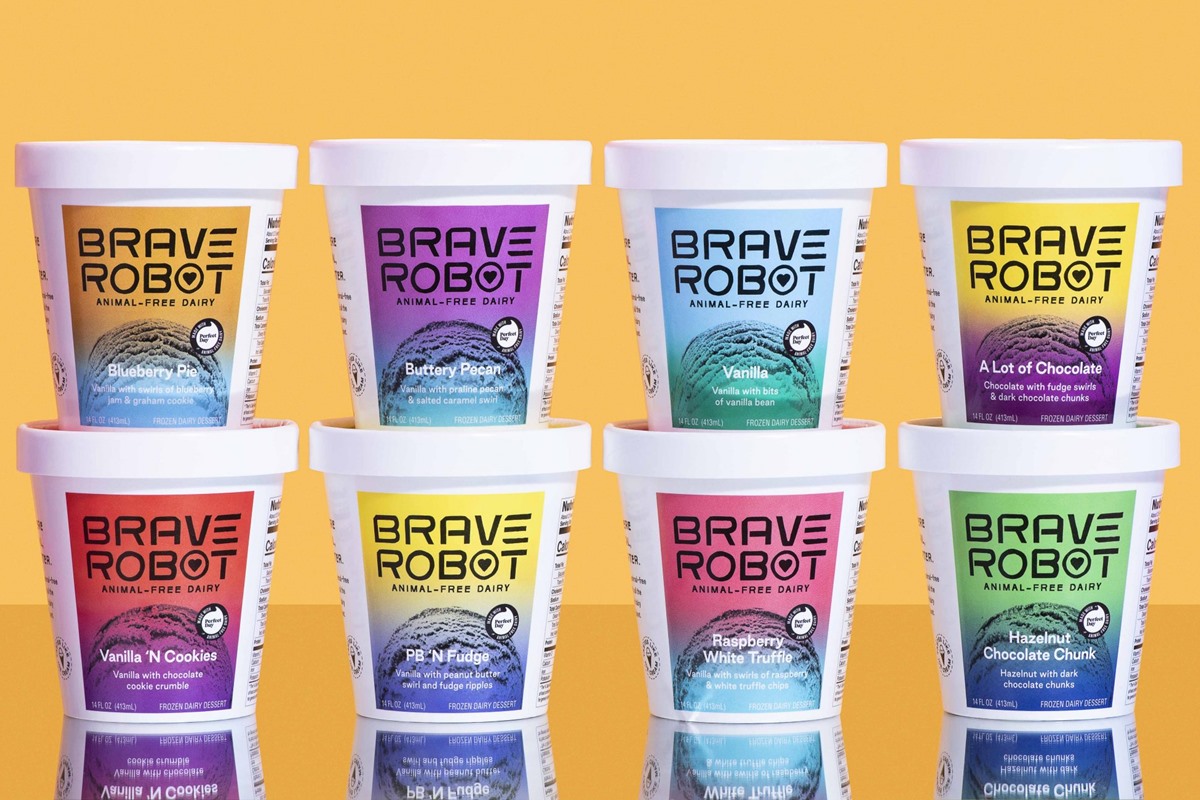
When Vegan Isn’t Dairy-Free, a New Era of Engineered Food
A Silicon Valley start up, called Perfect Day, can now create milk proteins (casein and whey) without cows or any other mammals. How? They’ve transitioned milk production from factory farms to hi-tech production facilities. A representative from Perfect Day explained their process as follows.
… there are specific genes responsible for making dairy protein. In the conventional method of making milk, these genes are present in cows and instruct their bodies to turn feed into milk protein. However, since scientists have already digitized the cow’s genome, we know what those genes are and can reproduce them, using DNA synthesis, in sequences that microflora can read and use. Using those genetic sequences, the flora is able to produce the same protein as a cow. Perfect Day uses a microflora called Trichoderma, which is one of the most common flora used to produce food ingredients.
The end result is actual cow’s milk protein that can be used to create dairy products. Since these dairy products didn’t involve cow’s in the manufacturing process, just their genetic road map, the company classifies them as animal-free, plant-based, and vegan. But make no mistake, these genetically engineered products are dairy. And even the company confirms that they are not safe for many people with milk-free needs.
Who are Perfect Day Products for?
The primary mission of Perfect Day has been sustainability. People who make vegan purchases based solely on environmental or animal rights concerns might feel better about purchasing products made with Perfect Day’s dairy proteins. No cows are directly used in the making – just software, petri dishes, and production equipment.
Perfect Day products are also hormone-free, so they are a possibility for consumers seeking dairy without hormones. And they’re lactose-free, since the company is only reproducing the isolated proteins, not the other components in milk. People who currently consume lactose-free products without issue might be fine with dairy products made from Perfect Day milk proteins.
But if you are allergic or sensitive to cow’s milk protein (casein or whey), Perfect Day states to avoid their products. As always, if you are dairy-free for any medical reason, then you should speak with your physician before considering any product that is labeled as dairy.
Will Genetically Engineered Milk Proteins be Disclosed on the Label?
Per the FDA food allergen labeling regulations, milk must still be clearly disclosed on the ingredient statement. But even that could be a bit confusing. One product states “non-animal whey protein” in the ingredients, and then “contains milk protein” at the end of the statement. I want to make sure you are aware of what “non-animal” milk proteins are. The company isn’t required to elaborate on the ingredient or to state the protein is genetically engineered.
“Vegan” Products that Use Perfect Day Milk Proteins
Products made with Perfect Day proteins might carry labels like “vegan,” “plant-based,” “lactose-free,” or even “animal-free,” but they are not dairy free. Perfect Day boldly states “Dairy” on their own brand, but this isn’t the case with all brands using their milk proteins.
Below are examples of “vegan” products that are made with Perfect Day dairy proteins. The list will likely grow, particularly since they are currently working on a marketable vegan dairy milk. And the company has recently acquired even more funding. So keep you eyes open!
Perfect Day Ice Cream
Perfect Day test marketed their first pints under their own name last year. They produced 1000 pints, and sold them for a whopping $20 a pint. Despite the hefty price tag, every pint was gone within 24 hours. These pints won’t hit the mainstream, but they have begun marketing their vegan dairy ice cream under other names.
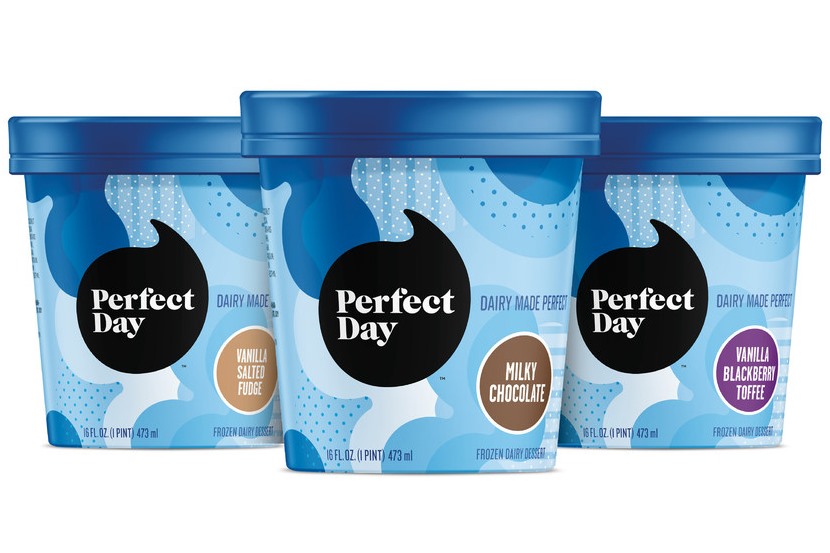
Brave Robot Ice Cream
Perfect Day spun off The Urgent Company to create a consumer-ready brand: Brave Robot. These new “animal free dairy” ice cream pints have a more friendly price point. And they are already landing on grocery store shelves in California.
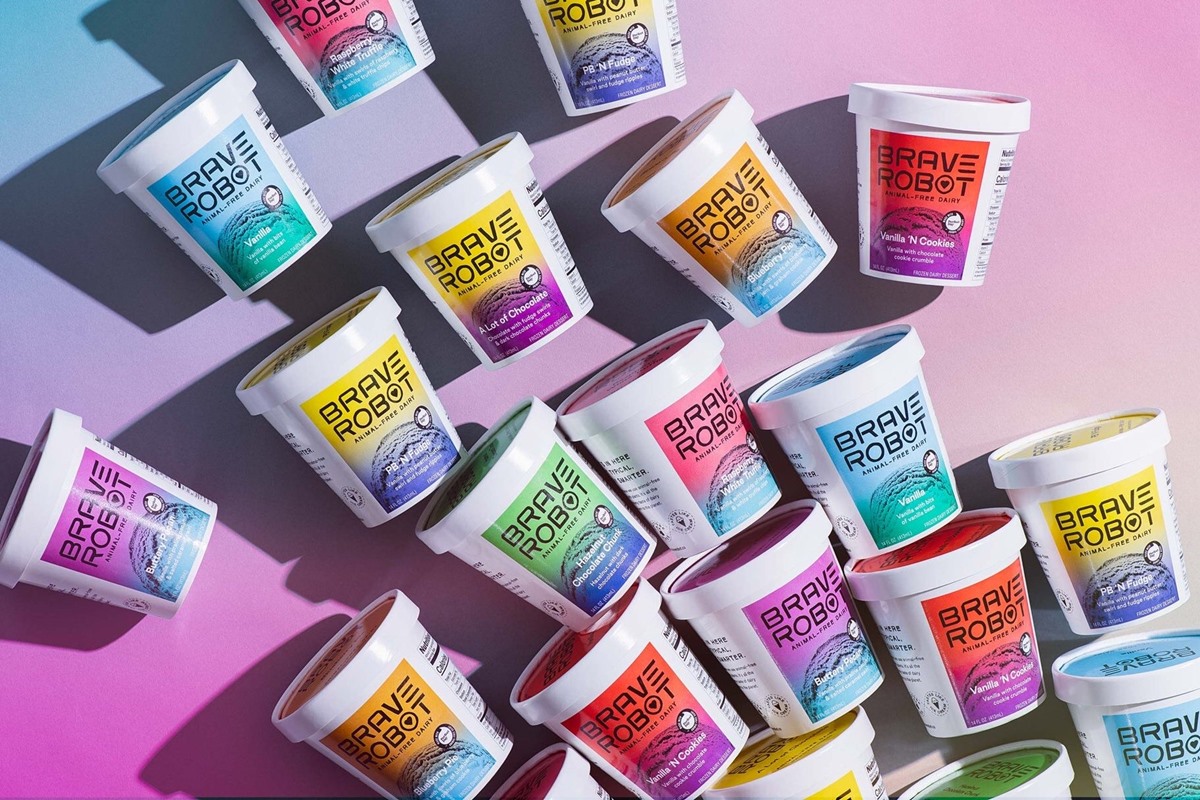
Nick’s Vegan
They’re a classic ice creamery that decided to partner with Perfect Day to create a full line of pints. They are boldly labeled as “vegan” with “contains milk allergen” in small print.
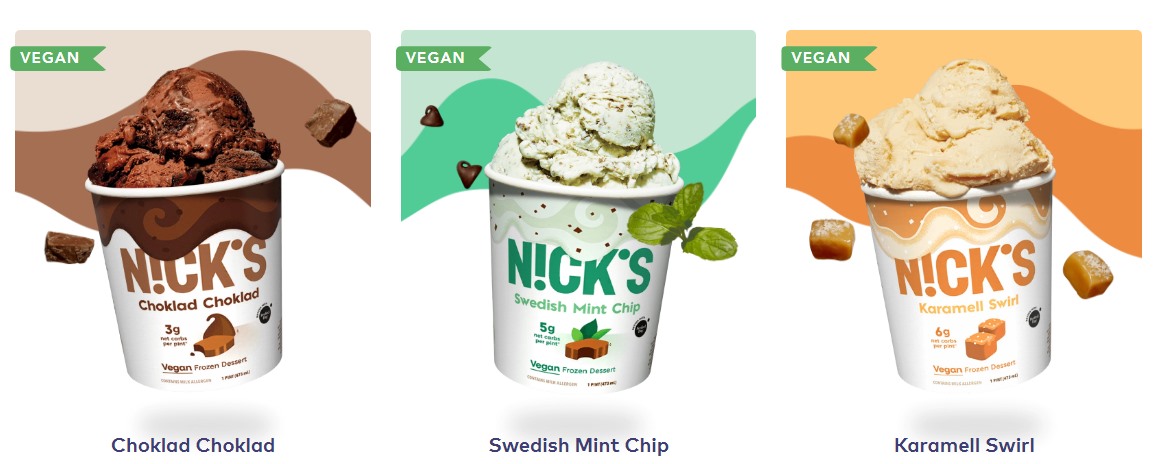 Photo from Nick’s
Photo from Nick’s
Smitten Ice Cream
A local San Francisco company called Smitten Ice Cream has also teamed up with Perfect Day. They’ve launched a new N-Ice Cream line under their own brand, but made with vegan milk protein. Unlike the others, their packaging is a little more deceiving. It states “vegan” and “lactose free” without a noticeable mention of dairy. Their artisan touch also carries a much higher price.
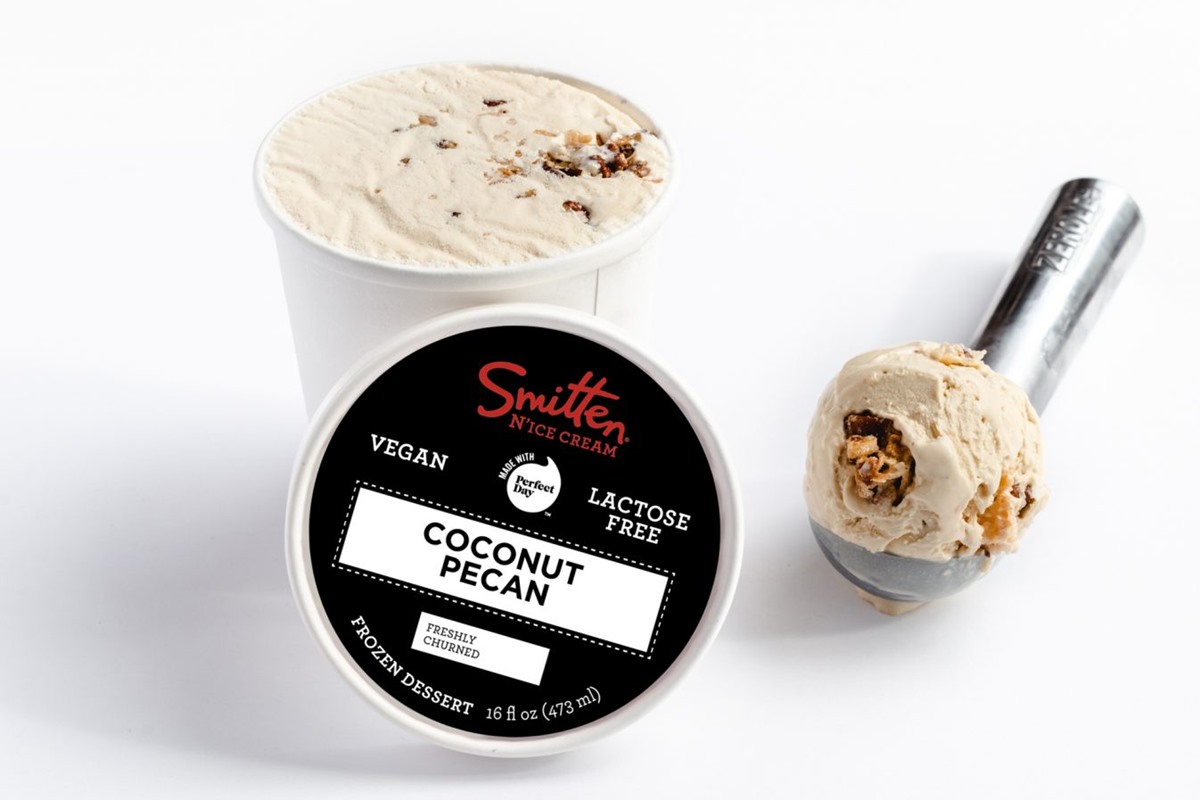 Source for All Photos Above: Perfect Day Foods
Source for All Photos Above: Perfect Day Foods
Graeter’s Perfect Indulgence
In 2020, Graeter’s launched a “vegan” line with Perfect Day’s milk protein. It’s labeled as animal-free and lactose-free, but like those above it is not dairy free.
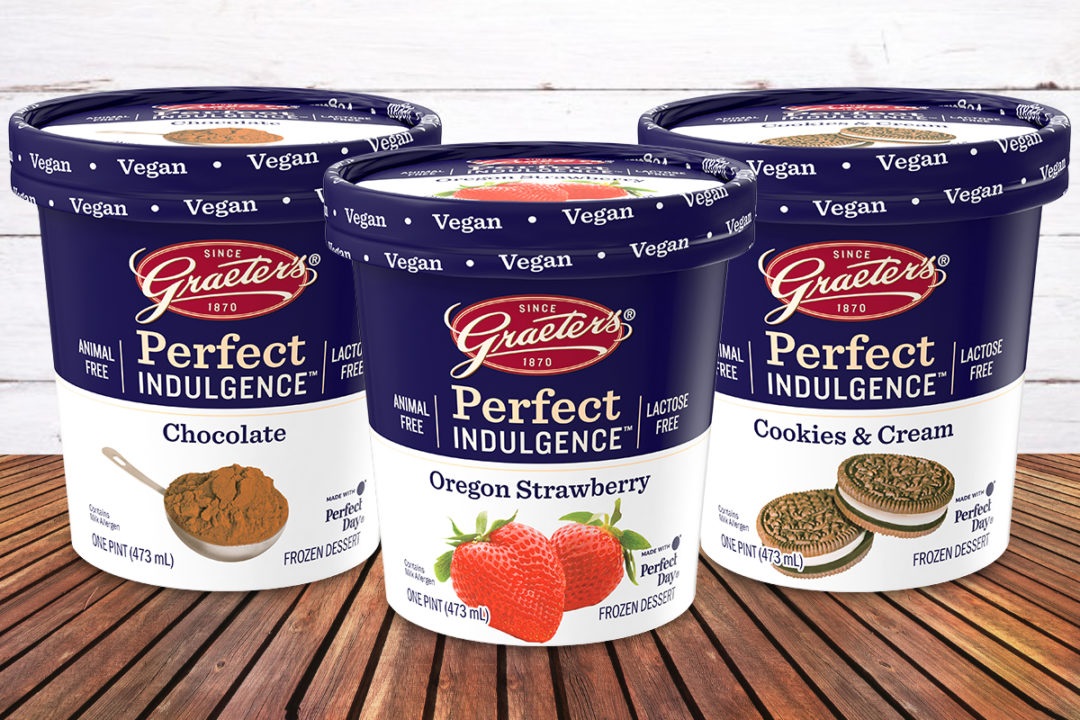 Photo Source: Graeter’s Ice Cream
Photo Source: Graeter’s Ice Cream
Ice Age
Igloo Desserts in Hong Kong partnered with Perfect Day to launch their new Ice Age Ice Creams, which are “vegan,” but not dairy free.
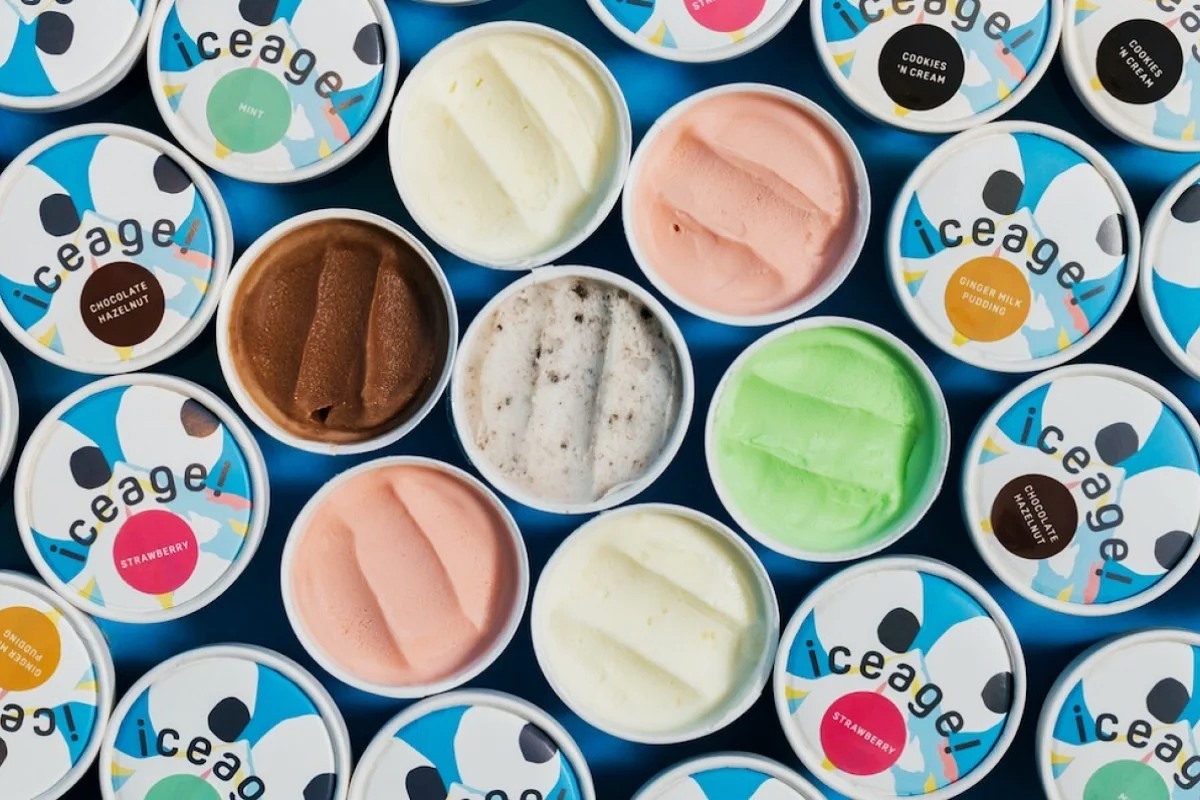 Photo Source: Igloo Desserts
Photo Source: Igloo Desserts
Our Question: Why Not Human Milk?
Why did Perfect Day choose to create cow’s milk proteins instead of human milk proteins? It’s genetically engineered, so in theory, they should be able to create human milk proteins just as easily as cow’s milk proteins. Human milk protein would not only be a sustainable option, it could also be safe for almost all people, including those with milk allergies or sensitivities. Not to mention, human milk protein would be a more natural fit for our bodies. And it could be used to create medically necessary products, like better infant formulas and nutritional drinks. Is Perfect Day ready to take a bigger step for science and health?
*All manufactured foods are at some degree of risk for potential cross contamination with potential allergens like milk. If you have a severe or highly sensitive food allergy, you must always contact a manufacturer to discuss their allergen processes prior to consumption. Labels are added as guides, but only you can decide what is safe for your needs. See our May Contain Allergy Statement Post for more details.

24 Comments
Dairy does not mean cow products. Dairy means milk and milk products, regardless of whether they are produced by what are commonly called dairy cows, or not. That should mean that it applies to plant milk and yoghurt products, etc. too.
I’m not sure what you are saying here Cherryl. That dairy-free items should be labeled as dairy? To clarify, here is the definition: “Dairy products are foods or beverages produced from the milk of mammals.” That’s not what this post is addressing though. It’s about lab produced dairy, that isn’t dairy-free, but is being classified as vegan. It’s a confusing topic indeed!
I’m not confused by it at all.
I’m glad! But I’m still confused by your comment and not sure what you are saying!
This is an even bigger issue for the million plus Americans with alpha-gal allergy. Because we are allergic to hundreds of obscurely named mammalian byproducts (a list of all of them doesn’t even exist), we rely on vegan labeling to find safe foods. Despite our numbers and the severity of our reactions (up to 60% of us have anaphylactic reactions), we aren’t protected under FALCPA. If cell-based mammalian products are allowed to be labeled vegan, many of us are going to be constantly in and out of the ER.
My thoughts exactly. While the evolution of food science is exciting and the growing trend of veganism is very promising from an environment standpoint, I am most concerned with the ambiguity this will create in food labeling. I am dairy allergic and terrified that I’ll be served a “vegan” dish at a well-meaning vegan restaurant only to be rushed to the ER before dessert is served.
This stuff is great news: all the environmental reasons for going vegan are covered. However, you make a good point: why not go directly for recreating the main ingredients in mothers’ milk with bacteria? I suppose they will though, the field is wide open for artificial baby’s milk through this process. Not as good as the real thing, obviously though.
Even this stuff merely recreates two of the substances in cows milk, not the whole package. You still need a cow for that.
And yes, people with food allergies have a more complicated ‘read the labels’ thing coming.
As a heads up to others, it is an issue for anyone who has issues with milk protein, not just those who are allergic. I don’t want anyone to be confused!
Thank you so much for this article Alisa, it is very helpful. I too am allergic to casein & whey and unfortunately do rely on the “vegan” label when purchasing products, but always read the labels to be sure since I have been burnt before. Like William said: “vegans beware”
Glad I can help – food is a confusing industry!
So it will have all the negative health effects of normal dairy plus anything else caused by manufacturing process? Hahaha. Only a moron would purchase this garbage.
Casein and whey protein are the most significant carcinogen discovered since the beginning of time ! So unhealthy.. and likely the only cause of death by hormonal cancers like breast, ovarian, testicular and prostate. How can u call yourself ethical if you deliberately putting something in people’s food that would cause cancers. Ffs.
Thanks for this helpful article. I’ll be sure not to buy these products with dairy. It’s too bad marketing is more important to these companies than actually being vegan. I’d respect a company starting they’re “almost vegan” instead of using a vegan label but don’t appreciate when brands (and restaurants now too) claim vegan yet include dairy.
If the goal of veganism is to end the suffering of other animals at the hands of humans (and it is), then this company/technology/product is very vegan. It could end the suffering of millions of dairy cows, and we wouldn’t even have to achieve the (frankly impossible) feat of convincing everyone to quit cheese. Of course it still won’t be healthy, but people who eat cheese don’t care, and that has nothing to do with veganism.
Yeah, I think we really need to start making the distinction between ‘vegan’ and ‘plant-based’ now..
I’m an ethical vegan (3+ years), and dairy was the toughest thing to give up (taste/habit-wise anyway), so I’m really excited about stuff like this!
And of course it’s vegan – no pens, no forced artificial insemination, no gendercide, and no separating infants from their mothers. Humans could never interact with another cow again and it wouldn’t impact this process.
We’ve been sequencing & decoding all the genetic information we can for years now, and using that information for new advances, like obtaining cow’s milk without harming cows.
People who say this isn’t vegan based on the fact that we’ve copied and are utilizing part of the cows’ DNA need to take a step back. Veganism isn’t some super pure philosophy or moral high ground for people to occupy. It’s about not harming other living beings, especially other animals, for our own gain, and this new technology can help accomplish that far more quickly than the painfully slow process of convincing other people that animals deserve rights.
* Environmental impact is an innate part of veganism, so if this manufacturing process has a negative enough environmental impact, then it may be fair to say it’s not vegan, but I’m fairly certain it has a less negative environmental impact than the dairy cow industry, so this is still better.
Rather than calling the products vegan, which is typically defined as “not containing animal products,” why not label them “cruelty-free?” This would serve the needs of both people who care about animal welfare and people with allergies.
I do not want to ingest anything made for a calf.
Super interesting, thank you for posting! I suspect my dairy allergy is actually an adverse reaction to the cow hormones in the dairy (I get horrible cystic acne on my chin area), and not that I can’t digest whey or casein. This might be actually something I can consume & get the benefits of being able to get protein from dairy again.
I’m struggling to understand how extracting and capitalizing on animal DNA fits within the tenets of veganism. From where I stand, as an ethical vegan, it doesn’t.
I also now am concerned because I have to avoid milk proteins because of allergies 😔
If this becomes mainstream, all of us with allergies will be at risk. Is it ethical yes. Is it ableist? Also yes. This is both awesome and infuriating.
Alisa, thank you so much for this critical information. It seems that some days we just can’t win. It’s the darn casein and whey that I can’t have. I also can’t have gluten but that’s an entirely different ball game.
Thanks again and keep up the good work! M.
Thank you! I know how frustrating it can be – and with gluten issues even more complicating. I’m here to help! 🙂
I’ve been a Vegan for 40 years. I have seen all these new “vegan friendly” foods appear in the last couple of years and I am very angry that the vegan society has decided to allow quite a few of these so called “vegan friendly” foods to carry the official Vegan sign, even though the product has been created on a processing line also used for dairy products etc.
I have read the small print of many new vegan products and noticed that most state that anyone with dairy intolerance should not use such products as they could be likely to have traces of dairy in them. The so called vegan society is happy to receive payment from the makers of these false products. I have had telephone and email communication with them regarding this betrayal but to no avail.
I fear the vegan society have become more susceptible to financial gain than the true ethical value of Veganism. These new “dairy not dairy” products cannot in any way be classed as being truly Vegan! The very idea is repulsive to me and I suspect, to all true vegans.
Regarding all these new products and the promotion of them, I feel I have to say loudly _____
“VEGANS BEWARE”!!
Very confusing indeed.who needs this? So i guess now vegans can eat a lab produced stakes as well since no animal is involved in its production?